Toen ik deze serie van boeken artikel begon was de titel: Nooit meer een ‘guru’ nodig. Want dat is precies wat je met het lezen van kwalitatieve boeken bereikt. De kennis en inzichten die in tijdloze boeken te vinden zijn, brengen je meer waarde dan wat dan ook. Of het een online cursus of seminar is van een of andere coach die zelf ook maar wat napraat. Of een opleiding die je een paar duizend euro kost en uiteindelijk niets verder brengt. Het lezen van boeken heeft veel voordelen, de grootste is het niet nodig hebben van iemand die het beter weet. Met de juiste boeken neem je principes en concepten tot je, waarmee je zelf je plan kan schrijven en uitvoeren. In dit artikel mijn boeken top 15 voor ondernemen.
Mijn boekenkast is gevuld met boeken, waaronder deze 15 boeken. Ik lees tussen de 15 tot 20 boeken per jaar. Van dikke pillen tot kleine paperbacks. Lezen heeft voor mij een aantal grote voordelen. Het dwingt me om stil te zitten en te focussen op 1 ding, bijna als een soort meditatie. Ik leer ervan en kan deze kennis toepassen in mijn eigen leven. Meer over mijn liefde voor lezen in het artikel: Hoe maakt lezen jou een betere belegger/investeerder.
In vorige boekentop-artikelen kwam ik tot 5 (vastgoed) en 7 (aandelen) boeken. Nu heb ik er 15. Vooral omdat ik meer boeken heb gelezen over ondernemerschap dan het beleggen in vastgoed of aandelen. Ook denk ik dat er meer complexiteit en verscheidenheid is in het runnen van een business dan het investeren in aandelen en al helemaal in vastgoed. De individuele verhalen van ondernemers en hun ervaringen tijdens hun carrière zijn vaak de mooiste en ongeëvenaard in hun diepgang. In deze lijst is er geen volgorde te vinden, al deze boeken raad ik aan om te lezen. Of je nu starter bent, of een senior positie hebt.
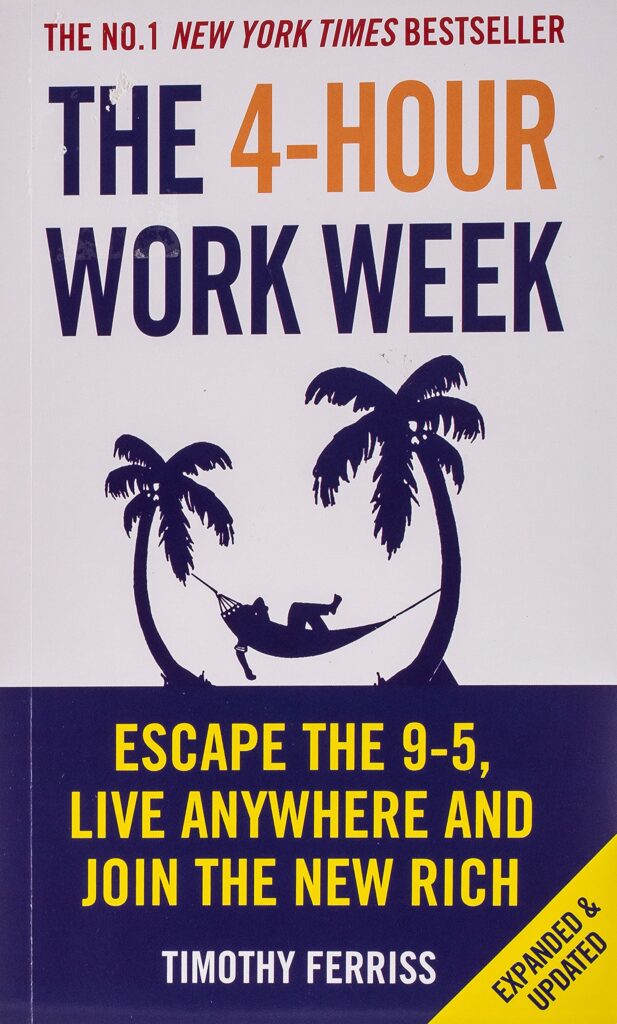
1. The 4-hour work week: escape 9-5, live anywhere and join the new rich – Timothy Ferriss
De reden dat dit boek als eerste op de lijst staat is omdat ik het las toen ik net klaar was met studeren. Ik wist dat ik wilde ondernemen en kende alleen het ‘oude’ ondernemer, zoals ik bij mijn vader in het bedrijf zag. De nieuwe soort ondernemer zoals Ferriss die heeft geïntroduceerd is niet meer weg te denken uit de huidige online samenleving. Ook het concept dat vrijheid belangrijker is dan veel geld, sloeg aan. Je tijd zelf kunnen indelen brengt meer waarde in je leven dan succes, dus probeer zo efficiënt mogelijk je organisatie in te richten.
Niet iedereen is een internet-ondernemer of ‘solopreneur’. De concepten in dit boek zijn veel breder en voor iedere ondernemer interessant. Of je nu starter bent die nog zoekt naar zijn juiste strategie, of een ervaren ondernemer die graag meer tijd vrijmaakt zonder concessies te doen in succes, dit boek is erg waardevol.
Quotes:
- What we fear doing most is usually what we most need to do.
- But you are the average of the five people you associate with most, so do not underestimate the effects of your pessimistic, unambitious, or disorganized friends. If someone isn’t making you stronger, they’re making you weaker.
- If you are insecure, guess what? The rest of the world is, too. Do not overestimate the competition and underestimate yourself. You are better than you think.
- Focus on being productive instead of busy.
- To enjoy life, you don’t need fancy nonsense, but you do need to control your time and realize that most things just aren’t as serious as you make them out to be.
- Being able to quit things that don’t work is integral to being a winner.
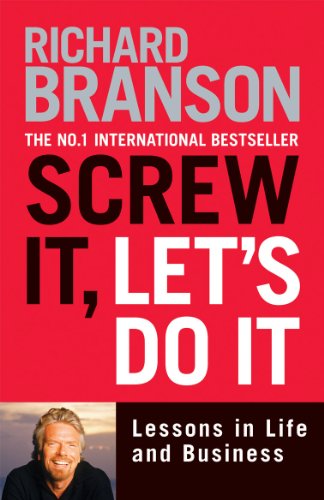
2. Screw It, Let’s Do It: Lessons in Life and Business – Richard Branson
Ik denk dat iedere ondernemer Richard Branson wel kent. Hij is de persoon achter alle Virgin bedrijven. Waar het begon met Virgin Records in de platenindustrie, heeft hij later onder andere een luchtvaarbedrijf, cola-bedrijf en ruimtevaartbedrijf gestart. Zijn drive om continu nieuwe bedrijven te starten maakt hem nagenoeg het rolmodel voor ondernemerschap. Zijn unieke verhaal van kleine jongen tot miljardair en alle levensgevaarlijke stunts en bedrijven ertussen maken dit boek een must.
Quotes:
- The best lesson I learned was to just do it. It doesn’t matter what it is, or how hard it might seem, as the ancient Greek, Plato, said, ‘The beginning is the most important part of any work’.
- If you opt for a safe life, you will never know what it’s like to win.
- Respect is about how to treat everyone, not just those you want to impress.
- Never do anything if it means you can’t sleep at night.’ It’s a good rule to follow.
- Hard-won things are more valuable than those that come too easily.
- And once we decide to do something, we should never look back, never regret it.
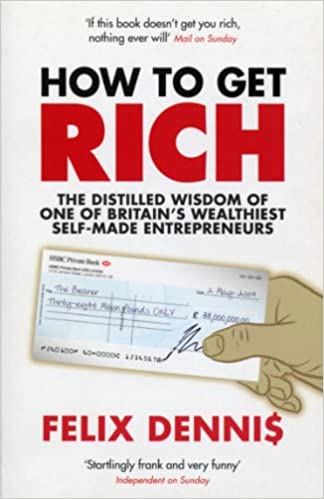
3. How to Get Rich – Felix Dennis
Ik kende Felix Dennis niet voordat ik aan dit boek begon. Ik had ergens gelezen dat het een aanrader was. En uiteindelijk willen we als ondernemers ook rijk worden toch? Door de titel op de kaft, neem je het niet snel mee in de trein of het vliegtuig. Maar toen ik de eerste bladzijdes had gelezen kon ik het boek niet meer neerleggen. Dennis is ook poëet, dus schrijven ligt hem wel. De wijsheden en ervaringen uit zijn leven zijn erg waardevol. Hij heeft alles zelf meegemaakt en dat maakt dit een zeer inspirerend boek. Hij is hard en duidelijk in zijn taal. Er is maar één manier om rijk te worden en dat is met ondernemen. En vooral met het hebben van de onderneming. Eigendom is alles. Zijn tips en aanbevelingen zijn niet allemaal nieuw, maar ze voelen oprecht. En komen dus ook binnen. Wil je geld maken? Groot worden? Dan moet je dit boek lezen.
Quotes:
- If you are unwilling to fail, sometimes publicly, and even catastrophically, you stand very little chance of ever getting rich.
- If you wish to be rich, you must grow a mental armor.
- A regular paycheck is addictive like crack cocaine.
- Working too long for other people can blunt your desire to take risks. If you want to be rich, you are not looking for a ‘career’, except as a launch pad or as a chance to infiltrate and understand a particular industry.
- Those who can never be rich may not want you to become rich
- Having a great idea is simply not enough. It is how ideas are implemented that counts in the long run.
- If you never have a single great idea in your life, but become skilled in executing the great ideas of other, you can succeed beyond your wildest dreams. Seek them out and make them work.
- Despite what you will read in many self-improvement tomes, ‘partnering’ and ‘symbiotic evolution’ are no way to get rich. They may be a way to a better world. They may make you a happier person and a better manager. But they will not make you rich – expect perhaps, in spirit. To become rich you must behave as a predator, I will go further, you must become a predator.
- To become rich you must be an owner. And you must try to own it all.
- Ownership is not the most important thing. It is the only thing that counts. Nothing else counts in the getting of money.
- You are trying to become rich. This must bet he main focus of your business life.
- You must cut loose, in your mind, from your previous life. Getting rich comes from an attitude of mind. It isn’t going to happen if things drift on pretty much the way they are right now.
- The world is full of money. Some of it has my name on it. All i have to do is collect it.
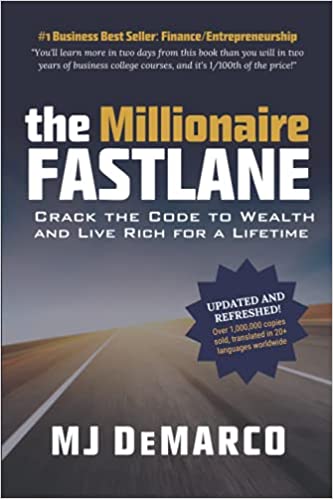
4. The Millionaire Fastlane: Crack the Code to Wealth and Live Rich for a Lifetime! – MJ DeMarco
Dit boek staat hoog op mijn lijst, omdat het een duidelijke weg naar onafhankelijkheid toont. Het belangrijkste concept is; de snelle weg naar onafhankelijkheid is een bedrijf of activiteit die een hefboom is op je tijd. Alleen met werken voor een baas ga je er niet komen. Sneller veel verdienen kan alleen met een bedrijf, personeel, technologie of andere ‘leverage’ instrumenten. Wil je miljonair worden of financieel onafhankelijk dan is dit soort denken onmisbaar. En dus ook dit boek.
Quotes:
- All self-made multimillionaires create their wealth by a carefully orchestrated process. Wealth is a process, not an event. Process makes millionaires, and the events you see and hear are the results of that process.
- The Fastlane process demands sacrifices that few make, to resolve to live like few can.
- More money is not a solution to poor financial management.
- Money buys freedom. Freedom buys choices.
- When you consistently act and bombard the world with your efforts, interacting with the waves of others, stuff happens.
- In a job, you sell your life for money. Time has no leverage.
- The rich use the markets for income and wealth preservation – not to create it!
- The fastlane is a business system (slowlane is a job).
- The winning team is team producer, become a producer first and a consumer second.
- Fastlane buy and sell appreciating assets: businesses, brands, cash flows, notes, IP, licenses, inventions, patents, and real estate.
- Divorce wealth from time (passive income). Money trees are business systems that survive on their own.
- Slowlaners use compound interest to get wealthy while fastlaners use it to create income and liquidity.
- A business attached to your time is a job.
- Scattered focus leads to scattered results.
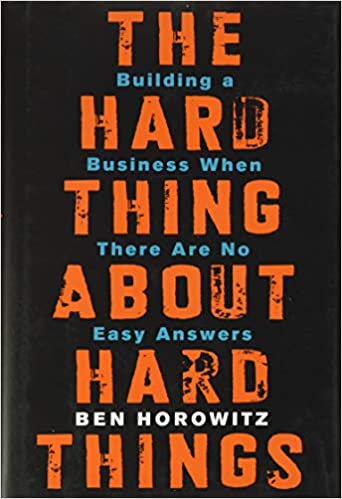
5. The Hard Thing about Hard Things: Building a Business When There Are No Easy Answers
Wil je weten hoe de startupcultuur er in Silicon Valley uitziet? Dan is dit boek van inmiddels venture capital investeerder Ben Horowitz perfect. Zijn reis van bedrijfsplan naar eerste funding, naar uiteindelijke verkoop leest als een roman. Dit zeer persoonlijke verhaal geeft je inzicht in het leven van een CEO. Over hoe hij ervoer om te dealen met investeerders, pivots en het algehele gevecht om een bedrijf van de grond te krijgen. Naast dit mooie verhaal, staan er heel veel lessen is voor andere ondernemers. En sommige adviezen zijn verrassend, modern en weer eens wat anders dan de standaardtips.
Quotes:
- 1st principle of the Bushido – the way of the warrior: keep death in mind at all times.
- The struggle is where greatness comes from.
- CEO’s should tell it like it is. Telling things as they are is a critical part of building trust.
- There comes a time in every company’s life where it must fight for its life.
- Take care of people, the product, and the profits – that order.
- Being a good company doesn’t matter when things go well, but it can be the difference between life and death when things go wrong. Things always go wrong.
- Running a company: there are always a thousand things that can go wrong and sink the ship. Focus on where you are going rather than on what you hope to avoid.
- Life is a struggle (Marx). Within that quote lies the most important lesson in entrepreneurship: Embrace the struggle.
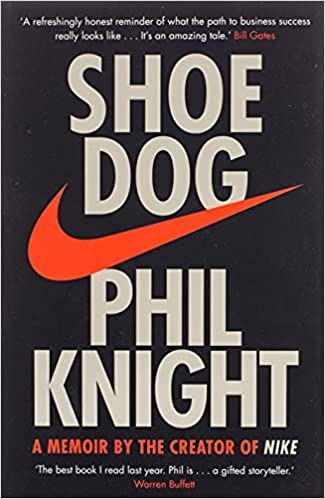
6. Shoe Dog: A Memoir by the Creator of Nike – Phil Knight
Dit boek van Nike oprichter Phil Knight is een van de beste memoires die ik gelezen heb. Toevallig gaat het over een ondernemer van een van de grootste bedrijven ter wereld. En dat maakt het dus interessant voor iedereen die een goed boek wil lezen en ondernemers. Ook hier kruip je in de huid van de ondernemer die zijn startup wil laten groeien. Daarbij lees je hoe hij naar Azië gaat om zijn producten te laten maken. Business deals en productontwikkelingen worden beschreven en de gedachtes erachter. Je leert zijn team kennen en voelt je haast deel van deze familie. Deze briljante zakenman heeft een zeer interessant leven geleefd. Dat maakt dit boek het lezen waard.
Quotes:
- The cowards never started and the weak died along the way. That leaves us, ladies and gentlemen.
- I’d tell men and women in their midtwenties not to settle for a job or a profession or even a career. Seek a calling. Even if you don’t know what that means, seek it. If you’re following your calling, the fatigue will be easier to bear, the disappointments will be fuel, the highs will be like nothing you’ve ever felt.
- Starting my own business was the only thing that made life’s other risks—marriage, Vegas, alligator wrestling—seem like sure things. But my hope was that when I failed, if I failed, I’d fail quickly, so I’d have enough time, enough years, to implement all the hard-won lessons. I wasn’t much for setting goals, but this goal kept flashing through my mind every day, until it became my internal chant: Fail fast.
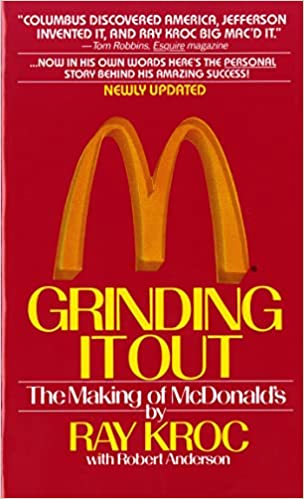
Dit verhaal gaat over de grondlegger van een ander gigantisch bedrijf, McDonalds. In dit boek lees je over de lange weg in zijn carrière en de lessen die hij heeft geleerd, om uiteindelijk te stuitten op een nieuw concept van de gebroeders McDonalds. Hij laat het uitgroeien tot een enorm bedrijf, met alle intriges en obstakels op de weg naar succes. Opvallend en inspirerend is dat hij al wat ouder was voordat hij met dit avontuur begon. Als je het idee hebt te laat te zijn in je leven om te ondernemen, dan heb je het mis. Een kans is overal te vinden, ongeacht hoe oud je bent.
Quotes:
- I was an overnight success all right, but thirty years is a long, long night.
- You must perfect every fundamental of your business if you expect it to perform well.
- Happiness is not a tangible thing, it’s a byproduct of achievement.
- I refused to worry about more than one thing at a time, and I would not let useless fretting about a problem, no matter how important, keep me from sleeping. This is easier said than done.
- A little bit of luck helps, yes, but the key element, which too many in our affluent society have forgotten, is still hard work.
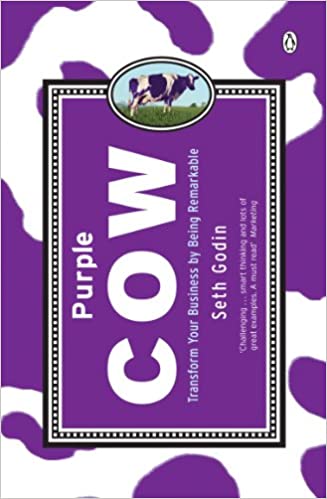
8. Purple Cow: Transform Your Business by Being Remarkable – Seth Godin
Als ondernemer moet je minimaal één boek van Seth Godin in je boekenkast hebben staan. Zijn stijl van schrijven en simplistische concepten maken hem een superster op managementgebied. Dit boekje gaat in op het uniek maken van je bedrijf. Het is marketing in een notendop. Je moet jezelf onderscheiden. Je mag niet saai zijn. Onderscheid jezelf en het succes zal volgen.
Quotes:
- Services that are worth talking about get talked about. Create an ideavirus.
- It is useless to advertise to anyone (except interested sneezers with influence). You must develop products, services, and techniques that the market will actually seek out.
- Differentiate your customers. Find the group that’s most profitable and most likely to sneeze. Figure out how to develop/advertise/reward this group, ignore the rest.
- Safe is risky.
- Create something remarkable.
- The only route to healthy growth is a remarkable product.
- Don’t be boring.
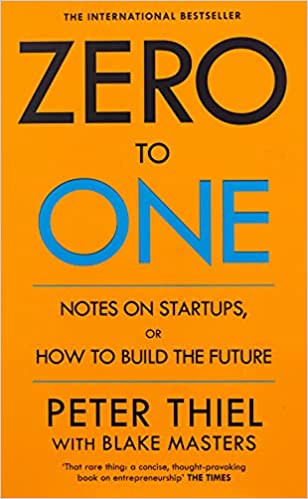
9. Zero to One: Notes on Start Ups, or How to Build the Future – Peter Thiel
Een andere grootheid uit Silicon Valley is Peter Thiel. Een van de oprichter (met onder andere Elon Musk) van PayPal en vroege investeerder van Facebook, maakt hem tot een enorm vermogend man. En als investeerder heeft hij een unieke blik op startups en groeibedrijven. Een belangrijk concept is dat ieder bedrijf naar een monopolie streeft zal streven. Want daar, zonder concurrenten, is het echte geld te verdienen. Een pure zakenman die door alle bullshit heen prikt en duidelijk schrijft waar het te winnen valt. Een boek voor iedere ondernemer.
Quotes:
- Monopoly profits, perfect competition doesn’t.
- Monopoly is the condition of every succesful business; 1) propietary technology, 2) network effect, 3) economies of scale, 4) branding.
- Every startup should start with a very small market.
- Don’t disrupt, avoid competition as much as possible.
- Better to be last mover and enjoy years of monopoly.
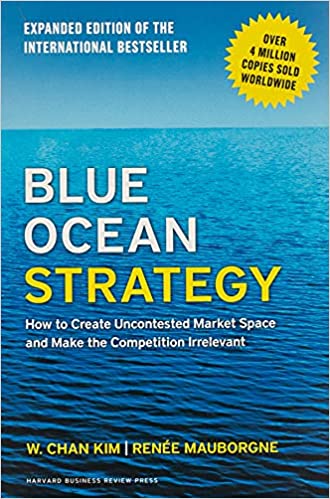
Als je je in managementkringen begaf toen dit boek uitkwam, werd je waarschijnlijk doodgegooid met de term Blue Ocean. Het was een enorme hit en is nu een beetje uitgedoofd. Maar het concept vind ik nog altijd heel sterk. Het doel als bedrijf moet zijn om een nieuwe positie te vinden in de hoofden van je klanten. Het is een volwaardige Blue Ocean Strategy als je meerdere voordelen met elkaar kan combineren, zoals meer waarde bieden aan de klant en het voor lagere kosten kunnen bieden. Dit boek is voor mij als bedrijfskundige misschien interessanter dan voor anderen. Maar toch een vernoeming waard op de lijst.
Quotes:
- Value innovation is the cornerstone of blue ocean strategy. We call it value innovation because instead of focusing on beating the competition, you focus on making the competition irrelevant by creating a leap in value for buyers and your company, thereby opening up new and uncontested market space.
- Blue oceans are right next to you in every industry.
- strategic planning should be more about collective wisdom building than top-down or bottom-up planning.
- Simply put, there is no substitute for meeting and listening to dissatisfied customers directly.
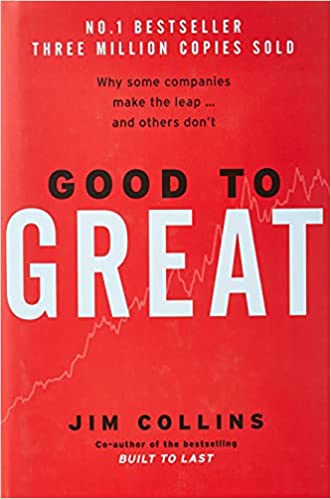
11. Good to Great: Why Some Companies Make the Leap… and Others Don’t – Jim Collins
Net na of tijdens mijn studie las ik dit boek van Jim Collins. Mogelijk lag het aan mijn studie bedrijfskunde en specifieke interesse in het gebied wat een bedrijf succesvol maakt, maar het sloeg in als een bom. Het onderzoek dat ten grondslag ligt aan dit boek is wetenschappelijk en over een lange termijn uitgevoerd. Dat geeft het een enorme geloofwaardigheid. Voeg daarbij de uitgekristalliseerde concepten die naar boven drijven en je hebt een winnaar in de managementboek categorie. Deze is voor iedereen die streeft om een bedrijf te bouwen dat na meerdere jaren nog altijd succesvol is.
Quotes:
- Good is the enemy of great. And that is one of the key reasons why we have so little that becomes great. We don’t have great schools, principally because we have good schools. We don’t have great government, principally because we have good government. Few people attain great lives, in large part because it is just so easy to settle for a good life.
- The purpose of bureaucracy is to compensate for incompetence and lack of discipline.
- Greatness is not a function of circumstance. Greatness, it turns out, is largely a matter of conscious choice, and discipline.
- Great vision without great people is irrelevant.
- A company should limit its growth based on its ability to attract enough of the right people.
- For, in the end, it is impossible to have a great life unless it is a meaningful life. And it is very difficult to have a meaningful life without meaningful work.
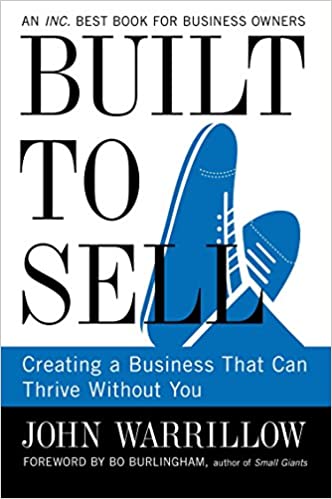
12. Built to Sell: Creating a Business That Can Thrive Without You – John Warrillow
Mogelijk is het verkopen van je bedrijf niet meteen iets waar je nu aan denkt. Maar het is vaak een goede manier om je levenswerk in je pensioen om te zetten. En waarom zou je niet al vroeg aan je bedrijf werken, zodat het verkooptechnisch prima in elkaar steekt. Het zijn namelijk niet alleen principes die je bedrijf verkoopklaar maken, het zijn ook manieren om je bedrijf minder afhankelijk te maken van jou, de ondernemer. En dat geeft je uiteindelijk meer tijd en ruimte om aan je bedrijf te werken, of iets anders te doen. Misschien hoef je het dan helemaal niet meer te verkopen!
Quotes:
- Isolate a product or service with the potential to scale. Both teachable and valuable and repeatable.
- Don’t generalize; specialize. If you focus on doing one thing well and hire specialist in that area, the quality of your work will improve and you will stand out among competitors.
- Relying too heavily on one client is risky and will turn off potential buyers. Make sure that no one client makes up more than 15% of your revenue.
- If buyers aren’t confident that your business can run without you in charge, they won’t make their best offer.
- Create products out of your service, standardize.
- Hire people who are good at selling products, not services. These people will be better able to figure out how your product can meet a client’s needs rather than agreeing to customize your offering to fit what the client wants.
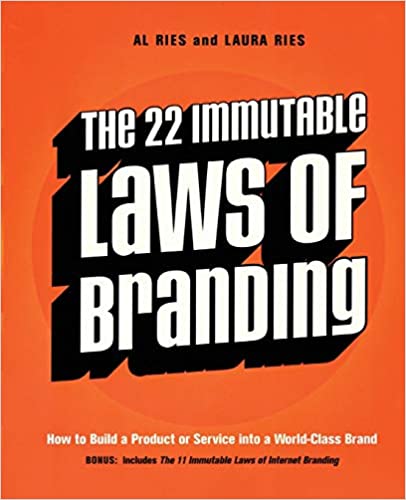
Als je dan toch een marketingboek in de boekenkast wilt hebben, kies dan deze. Het zijn haast tijdloze concepten die iedere ondernemer kan gebruiken om zijn of haar nieuwe producten te lanceren en groter te maken. Branding is hier het speerpunt. En er zijn genoeg ondernemers die nog een lesje branding nodig hebben. Lezen dus.
Quotes:
- Power of a brand is inversely proportional to its scope.
- A brand becomes stronger when you narrow its focus.
- A brand should strive to own a word in the mind of the consumer.
- One of the fastest routes to failure is giving a brand a generic name.
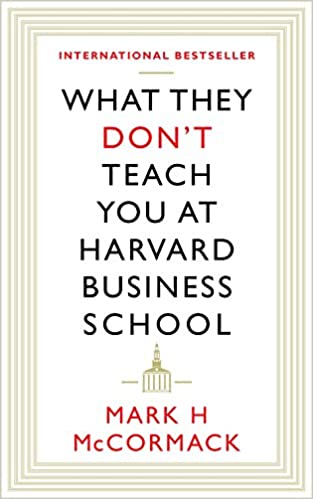
14. What They Don’t Teach You At Harvard Business School – Mark H. McCormack
Dit boek leert je de ‘street smarts’ van de zakenwereld. Het geeft je een enorme voorsprong op iemand die blind een onderneming induikt. Het hielp mij heel erg in het begin van mijn carrière. Zie het als een soort wijze ondernemer die jouw wat tips en trucs geeft voordat je begint aan je ondernemersreis. Een handig boek, boordevol advies.
Quotes:
- Commit early on to quality.
- Grow slowly, think long-term.
- Hire the best to teach you what you don’t know.
- Look to world markets.
- Start small and keep it simple.
- Don’t have partners.
- Turn fear of failure into positive energy to drive success.
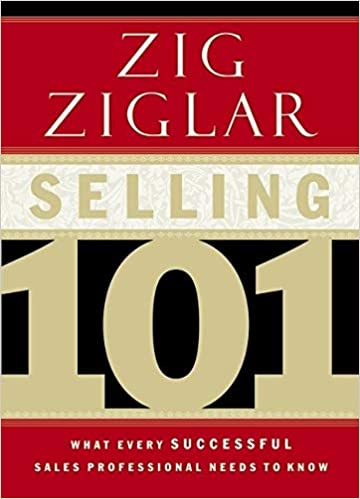
15. Selling 101: What Every Successful Sales Professional Needs to Know – Zig Ziglar
Als ondernemer ontkom je er niet aan. Je zult moeten verkopen. Sommige ondernemers zijn geboren verkopers. Anderen hebben er meer moeite mee. Maar beide groepen kunnen leren van Zig Ziglar. In dit Amerikaans boek, waar het ‘motivational self-help’ gehalte hoog is, leer je hoe je jouw verkoop naar een volgend niveau kan tillen. Naast dat leren verkopen ook een kwestie is van vallen en opstaan en zelfvertrouwen winnen, heeft dit boek waardevolle concepten waar je wat aan hebt. Soms moet je die Amerikaan zijn en gewoon vol erop duiken. Show me the money!
Quotes:
- You can have everything in life you want if you will just help enough people get what they want!
- Finding prospects: one that has need, and decision power.
- Always be prospecting.
- Get on a regular schedule and make an appointment with yourself to contact a prospect at the same time every day.
- Need analysis: find their need or want.
- People buy what they want, when they want it more than they want the money it costs.
- We don’t buy what the product is: we buy what the product does for us.
- Prospects think in ‘what’s in it for me?’
- Lead with need (not product).
- Always ask for the sale.
- When prospects say no, no must mean they don’t know enough to make the yes decision.
Vond je dit artikel behulpzaam, schrijf je in voor mijn nieuwsbrief en volg mij op het pad naar 10.000 EUR passief inkomen. Heb je een vraag of tips over investeren en beleggen? Ik hoor graag van je!
James


Één reactie op “Boeken top 15: ondernemen”
[…] hier de beste boeken voor:OndernemenInvesteren in VastgoedInvesteren in […]